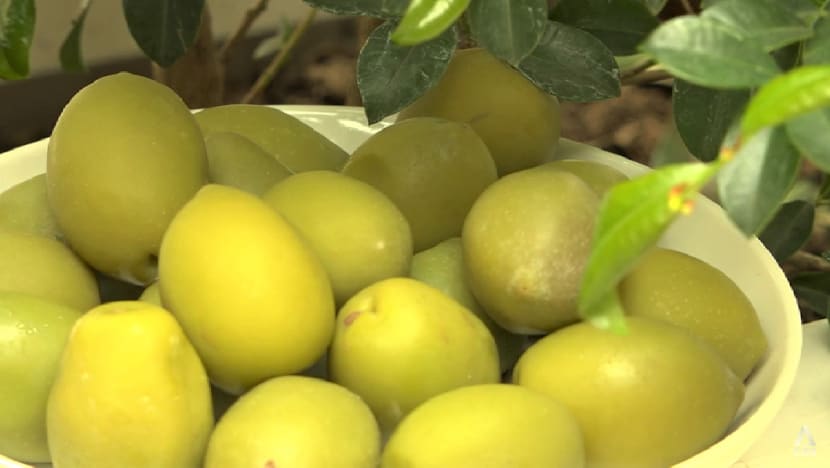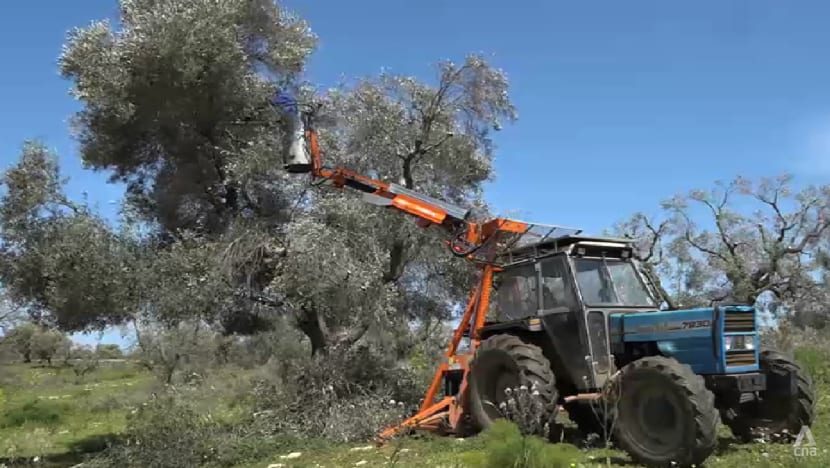Italy's olive harvest threatened, as deadly bacteria kills millions of trees
Xylella fastidiosa has killed more than 21 million olive trees so far in the southern Puglia region, which until recently, produced 50 per cent of the country’s olive oil.

In Puglia, olive oil is regarded as “green gold”. The region produces about 2 million tonnes of it every year, a centuries-old trade that relies on trees staying healthy and productive.
PUGLIA, Italy: Ms Carlotta Magli’s family farm used to produce 200 tonnes of olive oil per year.
Now, due to a deadly strain of bacteria, they make less than a third of that.
“My grandparents, my great-grandparents have always carried on agricultural activities, olive trees and even breeding,” said the 33-year-old olive farmer, who is the sixth generation of her family to be part of the farm.
“Let's say we have been living in this place for centuries now and we are very fond of it. Therefore, this issue hits us right in the heart.”
For about a decade, Italy’s olive trees have been under vicious attack from the bacterium Xylella fastidiosa.
It has killed more than 21 million olive trees so far in the southern Puglia region, which until recently, produced 50 per cent of the country’s olive oil.
OLIVE TREES CENTRAL TO LOCAL ECONOMY
Some olive trees in this region have been around for thousands of years and are central to the local economy.
In Puglia, olive oil is regarded as “green gold”. The region produces about 2 million tonnes of it every year, a centuries-old trade that relies on trees staying healthy and productive.
Scientists believe the bacteria strain first came to southern Italy in 2008, from a coffee plant from Costa Rica.
Climate change then helped to create a perfect storm.
Professor Massimo Reverberi of the Sapienza University of Rome, said: “Bacterial pathogens have, in some way, some specific needings for high temperature and high moisture.”
He added: “And the climate change, as I say starting from almost 15 years ago, you have these dramatic rainfall events that heightened the moisture of the region, which is usually very arid.
“But this heightening humidity, in some way, creates the proper conditions for the development of Xylella.”
The bacterium, which is carried by insects which rapidly spread it from field to field, stops water from flowing around an infected tree and in turn chokes it to death.
FARMERS DETERMINED TO FIGHT BACK
Olive farmers are now determined to fight back.
When the bacterium is detected in a tree, it has to be eradicated. Farmers may also have to destroy surrounding trees.

One company, OlivaMi, lets people adopt a newly-planted tree that is resistant to Xylella for just over €30 (US$33) per year.
In return, customers receive a litre of olive oil delivered straight to their door.
OlivaMi managing director Simone Chiriatti said the Salento region, at the heart of olive oil production in Puglia, used to provide work and opportunities for residents.
“Today, all of this has disappeared. But I think of the future, of the possibility, if we get together, if we have the right spirit and also a convergence of interests, we can make this land reborn,” he added.
“Leaving aside private interests, without exploiting the land, there is the possibility of reviving Salento as it was.”
IDENTIFIED IN OTHER PARTS OF EUROPE
OlivaMi’s aim is to re-populate the countryside, replacing some of the over 21 million trees lost to Xylella.
In Bari, one of the region’s biggest cities, local officials have focused on containing the spread of the bacterium.
The government has provided some US$330 million as compensation to farmers and to restore production levels. The European Union has also been involved in containment efforts.
Xylella has been identified in other parts of Europe including Portugal and Spain.
“Unfortunately it is not only present in Puglia, but Xylella has also been found in Spain, France and Portugal, even if they are different subspecies,” Puglia Region Phytosanitary Observatory director Salvatore Infantino.
“The most aggressive one, unfortunately, has impacted the Puglia region.”
















